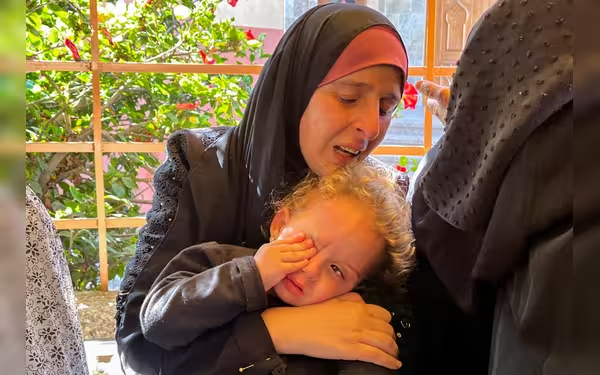Thursday, November 7, 2024 04:43 PM
WHO Evacuates 1,000 Gazan Women and Children for Medical Care
- WHO to evacuate 1,000 women and children from Gaza.
- Israel commits to facilitating medical evacuations.
- Urgent health needs highlighted amid ongoing conflict.
 Image Credits: arabnewspk
Image Credits: arabnewspkWHO plans to evacuate 1,000 Gazan women and children for urgent medical care amid ongoing humanitarian crisis.
The ongoing humanitarian crisis in Gaza has drawn international attention, particularly regarding the urgent medical needs of its vulnerable population. The World Health Organization (WHO) has announced plans to evacuate up to 1,000 women and children from Gaza to Europe for essential medical care. This initiative comes as the region continues to face severe challenges due to the ongoing conflict, which has left many in dire need of medical assistance.
Hans Kluge, the head of WHO's Europe branch, confirmed that Israel has committed to facilitating these medical evacuations in the coming months. The WHO, in collaboration with European nations, will oversee the process to ensure that those in need receive the necessary care. This development follows alarming reports from UN investigators, who have accused Israel of deliberately targeting health facilities and harming medical personnel in Gaza, labeling these actions as “crimes against humanity.”
In May, WHO representatives indicated that approximately 10,000 individuals required urgent medical evacuation from Gaza. Since the onset of the latest conflict in October 2023, the WHO has successfully facilitated 600 medical evacuations to seven European countries. Kluge emphasized the importance of maintaining open dialogue with all partners involved, stating, “This would never have happened if we did not keep the dialogue (open).”
In a broader context, Kluge highlighted the ongoing health crises in other regions, such as Ukraine, where health care workers face significant challenges due to the war. He noted that around 15,000 HIV-AIDS patients in the occupied territories of Ukraine are now receiving necessary medications, underscoring the critical need for health care access in conflict zones. Kluge firmly stated, “The most important medicine is peace,” advocating for the protection of health care workers and facilities in areas affected by violence.
As winter approaches, Kluge expressed concern for the civilian population in Ukraine, where 80% of the energy grid has been damaged or destroyed. He described the harsh conditions faced by medical professionals, who often operate under inadequate lighting. “It will be a very, very tough winter,” he warned, reflecting on the broader implications of the ongoing conflict on public health.
Despite the challenges, Kluge remains optimistic about Europe’s preparedness for future health crises. He noted that the 53 countries in the WHO European region have come together to develop strategies for managing pandemics, emphasizing the need for a global pandemic treaty. A European strategy for pandemics is set to be presented soon, aiming to enhance collective readiness for future health emergencies.
Moreover, Kluge stressed the importance of ensuring the continuity of essential health services to prevent disruptions similar to those experienced during the Covid-19 pandemic. He pointed out that many countries have faced significant health emergencies in recent years, highlighting the need for robust health care systems.
As the world grapples with the aftermath of the pandemic, Kluge aims to address pressing health issues, including the rising rates of anxiety and depression among young people and the growing inequalities in health outcomes between genders. He noted that the lockdowns during the pandemic have exacerbated mental health issues, with a reported 25% increase in anxiety and depression cases.
The WHO's initiative to evacuate women and children from Gaza for medical care is a crucial step in addressing the urgent health needs of those affected by conflict. As the international community continues to respond to these crises, it is imperative to prioritize health care access and support for vulnerable populations. The ongoing dialogue and collaboration among nations will be vital in ensuring that health care remains a priority, even in the most challenging circumstances.













